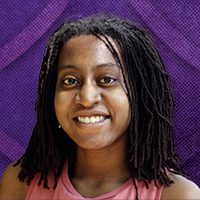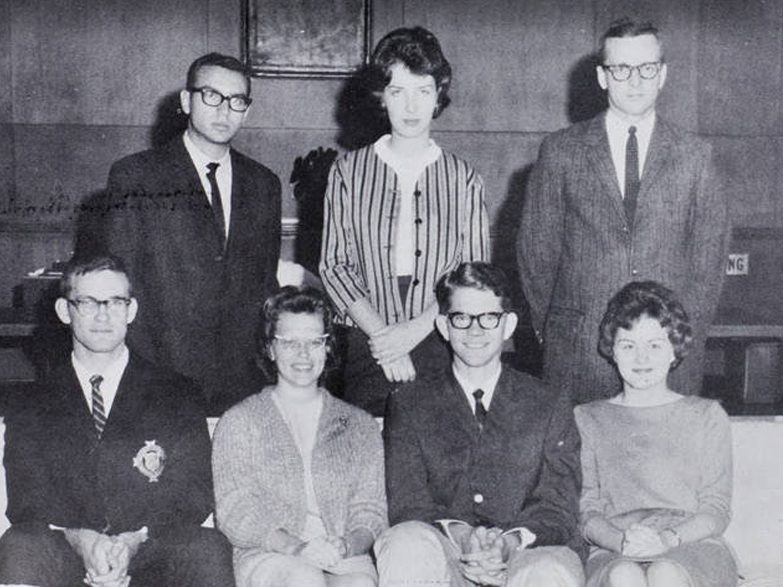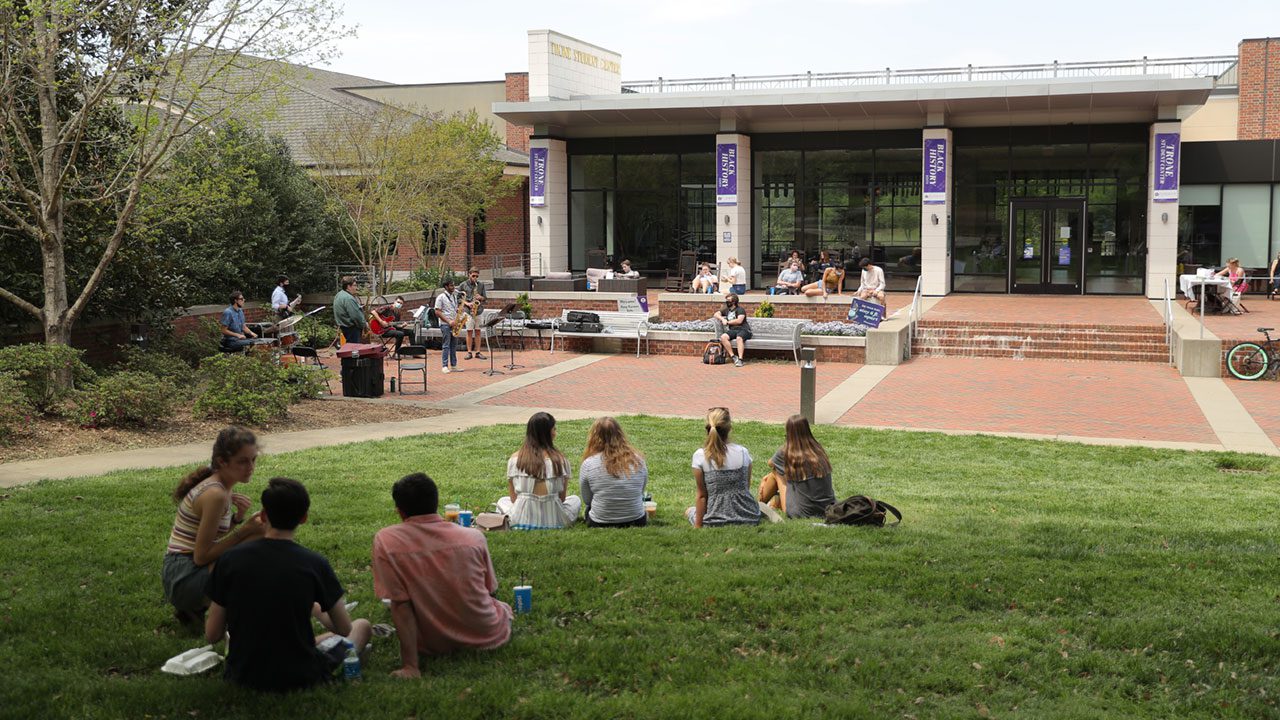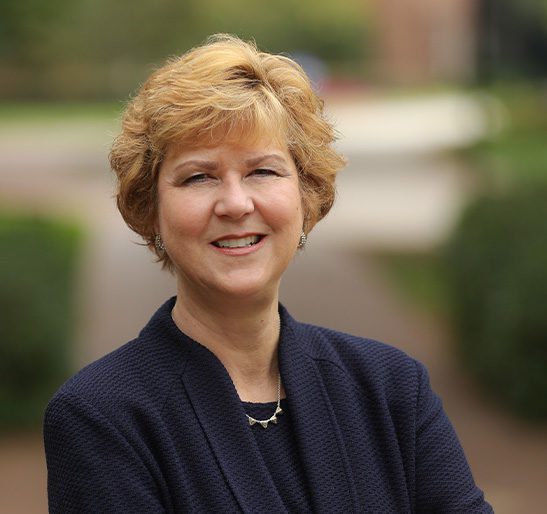
Then

STEVE COTHRAN ’86
Religion Professor Edgar McKnight’s Charleston drawl might just as well have belonged to a Lowcountry farmer.
Instead, he grew crops of Furman students who left each year more deeply rooted in their understanding of the New Testament.
In my first classroom experience – 8 a.m. Religion 11 – he highlighted our three test dates and instantly became my favorite professor after indicating we could drop our lowest grade. Fast forward to our third test. Weighing my solid B against a late night of studying, I exercised the preeminent wisdom only freshmen possess, congratulated myself and slept in the next morning.
I awoke refreshed, enjoyed a leisurely shower, and strolled back toward my room around 8:15 a.m. I opened the door as the phone rang, lifted the receiver, and heard a frantic shout: “Stephen! We’re having a test! Where are you?” Panic gripped me tighter than the towel around my waist as I stammered, “Uh … I thought we could drop our lowest test?”
“Well, you’ve got to have one first! Get over here!” Had Coach Dick Sheridan clocked me sprinting across campus, the great Stanford Jennings ’84 might’ve ridden the bench in the fall of 1982. In mere moments, I breathlessly skidded into my seat and stared at the test. Racking my brain for anything remotely relevant, I cobbled together a pathetic amalgam of gibberish that could only be described as a colossal waste of time. Mine and Dr. McKnight’s. When the bell sounded before I’d even seen the second page, I exhaled in disgust. There was no doubt this would be my lowest score. I sheepishly made my way to his desk mumbling, “Thanks, but I didn’t finish.”
“That’s OK,” he smiled through bushy eyebrows and thick spectacles. “Come back at 2 p.m. and you can do the essays.” To this day I wonder why I didn’t say, “No, thanks!”
Almost four decades later, I know. Edgar McKnight loved students and loved teaching because he wanted to share the truths that had been life-changing for him. And his love was life-changing for us.
ABOUT THE AUTHOR
![]()
Steve Cothran ’86 is an associate pastor to students and families at Central Baptist Church in Newnan, Georgia.
EDGAR MCKNIGHT, THE WILLIAM R. KENAN JR. PROFESSOR OF RELIGION EMERITUS AT FURMAN, DIED ON DEC. 29, 2020. READ MORE.
Now


ARIEL CRANK ’22
Come Fall Orientation of 2018, I could not stop crying.
It was terrifying. I was embarrassed for having driven down 8 1/2 hours from my suburban town in Burtonsville, Maryland, to simply break down underneath the hot South Carolina sun. Up north while filling out college applications, I wasn’t really aware of what I was going to do as a freshman in college. It was just to do the things that most 18-year-olds were planning to do.
The faces surrounding me were unfamiliar. People were laughing and chatting among themselves as I hung back within my orientation group. Back at home, in my high school, there were multiple races and ethnicities, but I didn’t see anyone who looked like me. And then the questions settled in. What if they don’t want anything to do with me? What if they ignore me? How am I supposed to fit in? Did I make the wrong choice? But over time, I made some new friends, and I realized that people were quite friendly here, even more than what I was used to up north.
I have benefited from therapy, and I am a lot more active with my friends and the people who are in my life. Now, as a rising senior, I am still learning how to make more time for myself and understand how to identify possible triggers for my anxiety. A student success coordinator at the Trone Center and staff members with Furman’s counseling services and the Center for Academic Success helped to coach me on managing my tests and assignments and my stress levels.
The whole experience of adjusting means that while I may struggle with anxiety, there are people who are able to help and provide the support that I need. To me, Furman is a support system, a web of connections that faculty and staff share with each other to work on building relationships with students.
I have also grown by acknowledging the fact that while life will not always be perfect, it will have its sweet moments, too, including hobbies, hanging out with my friends, or spending time with my family. Knowing this, the difficult times truly help me become stronger.
ABOUT THE AUTHOR
![]()
![]()
![]()
![]()
ARIEL CRANK ’22 is double majoring in English, writing track, and philosophy.
Next


ERIK CHING
The COVID-19 pandemic tested Furman’s nationally recognized undergraduate research program.
Before campus shutdown in March 2020, more than 280 students were preparing to serve as collaborative summer research fellows to nearly 110 Furman faculty members. That’s more than 10% of our student body, over one-third of our faculty and roughly $1 million in expenditures covered by diverse sources across campus. Few liberal arts and sciences schools can compare to that scale, and all of it was hanging in the balance as pandemic-induced uncertainties mounted.
In the end, Furman’s campus remained closed in summer 2020, but the administration made the funding available, and we converted to virtual experiences, causing us to lose nearly 50 of them, mostly in the laboratory sciences. But, in a remarkable demonstration of agility and commitment to the student experience, more than 100 faculty members converted their research programs to virtual experiences and worked with 232 research fellows over the summer. They studied everything from soil quality in the Upstate – using a drone equipped with multispectral sensors – to portrayals of God in Americana music.
Perhaps most impressively, survey data reveal that the 2020 Summer Fellows rated their experience just as highly as their predecessors, and in some key areas even more highly. If the pandemic has taught us nothing else, it is that silver linings exist.
During the research season of summer 2021, research fellows lived on campus and in-person mentoring returned. Two-hundred seventy-two students worked with more than 100 faculty members, who employed diverse formats – some virtual, some in-person and some a combination of both. One student wrote original jazz scores, another studied tectonic development of North America during the Mesoproterozoic era, and yet another examined the causes of death for American police officers who die in the line of duty.
Going forward, who knows? Perhaps virtual experiences will become a permanent option. Regardless, what we know for sure is that Furman students and faculty will continue to make good on The Furman Advantage by creating new knowledge and pursuing unique forms of creative expression.
ABOUT THE AUTHOR
![]()
![]()
![]()
![]()
Erik Ching was appointed the director of undergraduate research in 2017. He is also a professor in the history department who began his career at Furman in 1998.


